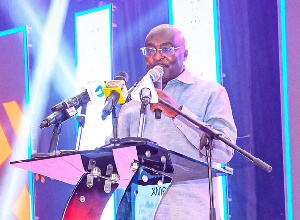- Home - News
- Polls
- Year In Review
- News Archive
- Crime & Punishment
- Politics
- Regional
- Editorial
- Health
- Ghanaians Abroad
- Tabloid
- Africa
- Religion
- Election 2020
- Coronavirus
- Photo Archives
- News Headlines
- Press Release
Health News of Wednesday, 17 December 2014
Source: GNA
Parliamentarians urged to champion Ebola prevention
Ghana Health Service with support from WHO on Tuesday engaged Members of the Parliamentary Select Committee on Health, Education and Local Government in an advocacy meeting to support the Ebola Prevention and Preparedness programme.
The meeting, which was part of the Social Mobilisation and Risk Communication Sub-Committee’s reviewed National Plan aims among other things, to create an enabling environment to ensure that individuals, communities, organisations and policy-makers are active partners in achieving change at the various levels.
Members of Parliament (MPs), are to complement the work of the health sector and other stakeholders by engaging actively in public education in their constituencies on the prevention and spread of the Ebola viral disease (EVD) should any case be detected in Ghana.
Dr Victor Asare Bampoe, in a speech read on his behalf said the involvement of MPs as advocates on Ebola is very critical considering their role as representatives in their communities and the relatively high influences they have on the people and also among their peers.
“Being advocates can make a huge difference in your communities in the unlikely event of any outbreak”, and also influence policies in the area of disease outbreaks in general,” he said.
He said half of Ghana’s health problems would be solved if MPs use their platforms to educate and influence attitudinal change of their communities towards issues including diseases like cholera, sanitation and stigmatisation among other things.
Dr Bampoe said the main task of the government is to have the public well informed about the disease to avoid panic should there be an outbreak.
He, therefore, appealed to the MPs to be advocates and speak in favour of Ebola, make recommendations for the promotion and support of new and ongoing programmes, in their constituencies and push for support for the National Plan.
On the global update on the EVD, Dr Henry Kyobe-Bosa, a Representative from WHO, said the EVD outbreak in the three affected countries were Liberia, Sierra Leone and Guinea, in the sub-region was on a scale that has never been experienced by any country.
He said the disease has caused considerable fatalities in these countries and remains a threat to Ghana and the sub-region as a whole.
According to him current WHO statistics puts the infections at 17,942 cases and 6,388 deaths and indicated that the organisation is mobilising support from the international community to help put up treatment centres for case management.
Dr Magda Robalo, WHO Representative said Ebola could only be stopped with the right kind of attitudes and Ghana has what it takes to battle the disease should any case be detected because there has been extensive training of frontline health workers and others at the country’s ports of entries.
He said extensive public education is therefore critical to help disabuse the minds of some Ghanaians that the EVD was a fabricated story.











